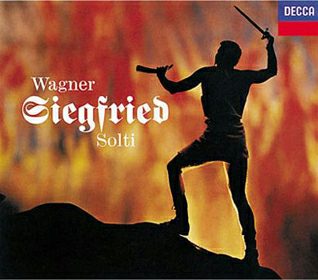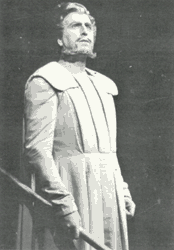| Music Home | Photo Gallery | Discography | His Lied recordings | Korean |
* HOTTER, Hans(19th Jan. 1909 ~ 6th Dec. 2003)
[ The eternal Wotan in Bayreuth ]
Contributed
to 'Classical Music',
Vol.4(Feb. 1997), p.202~7
Partially corrected on Jul. & Aug. 2001, 2003
 [ Left Photo ]
Hans Hotter(from Toshiba-EMI's Seraphim LP release)
[ Left Photo ]
Hans Hotter(from Toshiba-EMI's Seraphim LP release)
Recently, because the importance of the poem(text) in German Lied is so frequently said, everybody tends to forget when it is considered important. This concept prevails only from 20th century. In this point, two famous singer are eminent - of course Elisabeth Schwarzkopf and Dietrich Fischer-Dieskau. However, not being more famous, there was a senior artist to them. An aristocrat of German bass-bariton called 'the eternal Wotan in Bayreuth', Hans Hotter.
He was born in Offenbach, Germany. He moved
to Munich(mother's native city) when young after losing
father. He learned piano, and singed in a church choral.
He was moved at church music, so studied it so that he
would be an organist and chorus master. But his natural
beautiful voice made Matthäus Römer(Parsifal at the
Bayreuth Festival 1909, pupil of the famous artist Jean
de Retzke) regard him. He taught Hans singing. Hans
entered Munich Music Conservatory, and there learned
vocal music, piano and organ, and at Munich university
philosophy and musicology. He was taught acting by the
director of Munich opera.
His
début was the understudy of bass solist in Messiah.
and that of opera theatre the Sprecher in Die
Zauberflöte. We can hear this role
by the record with Böhm(DG).
At first his activity was at Prag and Breslau(now in
Poland), from 1934 to 1938 at Hamburg Opera, and at 1939
he contracted with Vienna State Opera. I heard he was
honoured by Kammersänger of the opera at the
same year. His first
appearance at Munich Opera was at 1937, and continued it
to 1972(Fairwell appearance).
After the WWII, his fame was spread
internationally. In the 1947 London trip of the Vienna
State Opera, he was unanimously praised as the title role
of Don Giovanni and launched the recordings with
EMI. The next year he sang Sachs in Die
Meistersinger in London, after which he was invited
by Covent Garden every year. He was revered as Wagnerian
from then on. From 1950, he appeared at Metropolitan.
Above all, his summit was the Bayreuth period from 1952
to 1966. His début was
Wotan and Kurwenal(Tristan und
Isolde), and his most famous role was the supreme
Wotan. His Wagner roles included Sachs, Pogner(Die Meistersinger), Amfortas, Gurnemanz, Titurel(Parsifal),
König Marke, Holländer; almost all of the Wagner
bass-bariton roles. He appeared once more at Bayreuth in
1968 as stage director of Wieland Wagner's postumous Ring.
 Except Wagner role, his opera repertoires
included very various roles from Mozart to Berg and
Schonberg. His Count(Le Nozze di Figaro) was
almost legendary by the perfectness. Sprecher
and Don Giovanni were his famous Mozart roles.
His other famous roles are Olivier(Capriccio),
Borromeo(Palestrina), the Grand
Inquisitor, Boris Godounov(title role). In
special, the legendary bass Chaliapin taught him the
Boris role at his Prag period. Therefore, it had been
Hotter's most confident role.
Except Wagner role, his opera repertoires
included very various roles from Mozart to Berg and
Schonberg. His Count(Le Nozze di Figaro) was
almost legendary by the perfectness. Sprecher
and Don Giovanni were his famous Mozart roles.
His other famous roles are Olivier(Capriccio),
Borromeo(Palestrina), the Grand
Inquisitor, Boris Godounov(title role). In
special, the legendary bass Chaliapin taught him the
Boris role at his Prag period. Therefore, it had been
Hotter's most confident role.
His
main activity after 1970 was
changed to the lied and stage production. His lied
repertoires are somewhat less than those of
Fischer-Dieskau(I guess it is because his voice was
nearer to bass register), but not less than those of any
other opera singers. His lied recordings include Loewe,
Schubert, Schumann, Brahms, Wolf, and R.Strauss - all of the great lied composers. Richard
Strauss himself taught Hotter, after Hotter sang his
works at the composer's 80th anniversary concert(1944).
Hotter was invited at the concert.
His official retirement appearance at opera
stage was in Vienna, as the Grand Inquisitor(Don
Carlos). But after it, he sometimes returned by
small parts. His Schigolch(Lulu) was
critically acclaimed.
His recent news are rare ; in 1992, he and Birgit Nilsson gave Georg Solti the birthday present(80th birthday) at the party at Covent Garden. I read an interview article last year. His recent look can be seen in a webpage(see below). He appeared at stage even at 84(as Schigolch or speaker in Mose und Aaron), passed away on 6th Dec. 2003 at his home of suburb of Munich.
Hotter's studio recordings are not much in
spite of his fame. Live recordings are more frequent, but
many of them have bad sound quality. His Wotan
can be heard by three set ; 1953 & 1956 Bayreuth
live(Knappertsbusch and Clemens Krauss conducting), and
the famous Solti's Decca recording. In this set, because
George London was casted at Das Rheingold, only Die
Walküre(1965) and Siegfried(1962) are his
Wotan. It's not necessary for me to explain this
recording. His voice was more or less old, but expressive
and strong tone is very good for this role. Other Wagner
roles are Gurnemanz in Knappertsbusch's 1962
Bayreuth live(Philips), and Pogner in
Keilberth's Eurodisc recording. Some of other Bayreuth
lives can be seen, and his Wotan in Rheingold was newly
issued by Testament(conducted by Keilberth, 1955 live
stereo). Other roles except Wagner are Sprecher
in Die Zauberflöte(DG; with Böhm), and Die
Frau ohne Schatten(DG; with Böhm).
His lied recordings are not so much as the
vast amounts of those of Fischer-Dieskau, but the most of
them is recorded at his summit. His  darker
voice can be better choice than Fischer-Dieskau. In the
recordings of Winterreise, Hotter's are surely
comparable to Fischer-Dieskau's by my taste. It was
surely his favorite. He recorded it four times, three in
studio and one by live. Schwanegesang(EMI, with
Moore) is deserved to be chosen as one of his best
recording. Other CD titles are Schubert, Schumann, and
R.Strauss recital(EMI), Brahms' recital including The
4 serious song(EMI), Dichterliebe(Preiser),
Wolf and Loewe lieds(EMI), the art of Hans Hotter I &
II(Decca). By effort of the Testament label, most of the
EMI lied recordings are available now. Moreover, DG
released his Winterreise with Werba and Decca
recordings as Original Masters series(but now deleted as
of 2007). Therefore, his lieds are much easier to get
than several years ago, which pleased me much as a fan of
his.
darker
voice can be better choice than Fischer-Dieskau. In the
recordings of Winterreise, Hotter's are surely
comparable to Fischer-Dieskau's by my taste. It was
surely his favorite. He recorded it four times, three in
studio and one by live. Schwanegesang(EMI, with
Moore) is deserved to be chosen as one of his best
recording. Other CD titles are Schubert, Schumann, and
R.Strauss recital(EMI), Brahms' recital including The
4 serious song(EMI), Dichterliebe(Preiser),
Wolf and Loewe lieds(EMI), the art of Hans Hotter I &
II(Decca). By effort of the Testament label, most of the
EMI lied recordings are available now. Moreover, DG
released his Winterreise with Werba and Decca
recordings as Original Masters series(but now deleted as
of 2007). Therefore, his lieds are much easier to get
than several years ago, which pleased me much as a fan of
his.
Other solo works are EMI's two records of Beethoven's Choral symphony(one by Karajan, with VPO, 1947, and the other by Klemperer with Philharmonia, 1957), Brahms' German Requiem by Karajan(with VPO, EMI, 1947), and Bach's Cantata No.82(EMI).
[ Right photo ; Hans Hotter as Wotan, from Hans Hotter Documentary ]
Resources
- His life ; mainly referred the liner note of Winterreise CD, DG POCG-3037(Japanese release)
- 'Siegfried' set cover photo ; Amazon(German)
- John
Culshaw ; book 'Ring Resounding'
Reminiscence by the producer Culshaw, when he recorded the monumental complete 'Ring' at studio at first. Whether you are a fan of 'Ring' or not, I recommend this good book in order to understand the modern recording. - Hans Hotter Documentary ; http://www.kbyu.org/fm/1999/hans_hotter.html
- Forum
; http://www.br-online.de/alpha/forum/vor9901/19990119.html(German)
We can see the photo of Hotter, at 90. I envy him his old face, good and graceful yet. - Peter Riis' page ; An article of Hans Hotter's fan
- The perfect Wagnerite ; Hans Hotter
- Bach
Cantata Recordings ; Hans Hotter's "Ich habe
genug, BWV.82"
Cantata lover's home, more than 10 recordings of BWV.82. He recommended Hotter's recording as the best(^^).
(c) 1997~ , Youngrok LEE ; Link free, but please get my approval before you reuse, copy, or quote this materials.
| Music Home | Photo Gallery | Discography | His Lied recordings | Korean |
Created ; 29th Sep. 2001
(original
Korean text created 8th Aug. 2001)
Last update ;
5th Jun. 2007